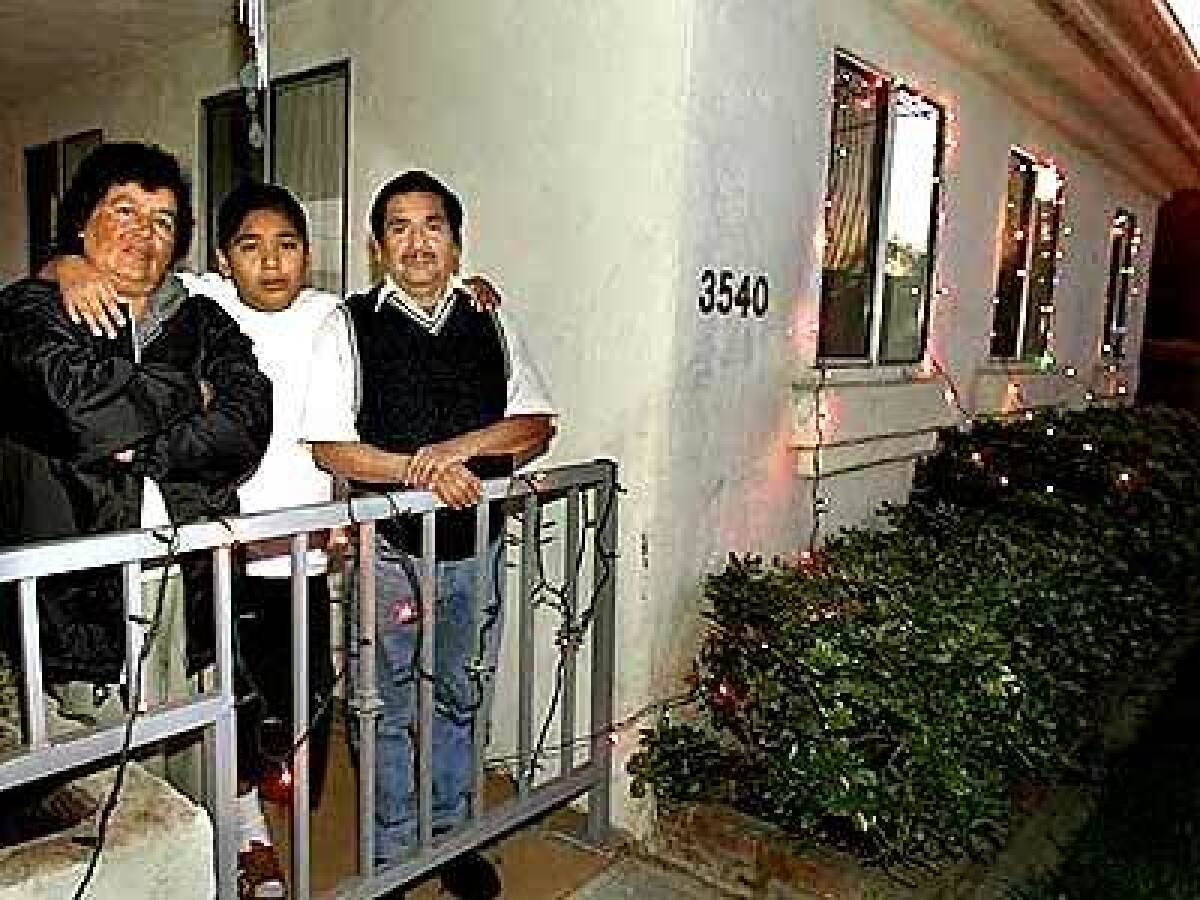Getting By, With Hard Work and Help From Strangers

- Share via
The little white truck still rolls though Venice in the wee hours of the morning. Rogelio Garcia still pulls a white bicycle from the back of the truck. He and wife Yolanda still patrol the neighborhood’s dumpsters, bars and hotels looking for recyclables.
The work routine has not changed for the Garcias, the couple who collect discards to support their family and help send two kids to college (“Getting By, One Can at a Time,” Feb. 25). But their life today has moved past the bleak existence it once was.
After reading their story, readers from across the Southland and around the world were moved by the couple’s determination to provide a better life for their children, despite their hardships. More than 300 sent the Garcias money in amounts ranging from $10 to several hundred. The contributions totaled about $23,000, most of which they have deposited in college accounts for their three children: Rogelio Jr., 21, a senior at Massachusetts Institute of Technology; Adriana, 20, who attends UC Riverside; and son Angel, 15, who is a sophomore at Venice High. The Garcias were able to afford braces for Angel.
There were also a few job offers for Rogelio, but nothing panned out. One, an apartment manager position about 10 miles away from their Venice apartment, looked promising, but the Garcias did not want to take Angel out of his school.
These days, with less financial stress, Yolanda is visibly happier as she traces her beachside route on a recent sunny day, balancing the bicycle stacked high with bags of aluminum cans.
“They gave me back my faith, the word ‘hope,’” she says, sitting in the living room of her new home.
New home?
With significant help from a reader, the Garcias in September left behind their one-bedroom Venice apartment and bought a modest three-bedroom house in a working-class Inglewood neighborhood.
“With so much wrong in the world,” a reader in Los Angeles wrote after the first article appeared, “what a wonderful, inspiring story about devoted parents striving so hard to build a better life for their children.”
A reader at a Massachusetts Air Force base wrote: “While life can be difficult, I am impressed by those who are willing to work through the challenges and be successful without government intervention.”
“Faced with their united strength of character,” a reader in Brussels wrote, “I was almost brought to tears, in part out of sympathy and admiration and in part out of self-pity for lacking their fortitude and work ethic.”
For Rogelio Jr., who is on track to graduate from MIT this spring with a degree in aeronautical engineering, there were two internship offers from aerospace companies. Over the summer he worked with a company in El Segundo--a position that will become permanent after his graduation.
Many readers and airlines’ representatives wanted to make sure the family would be able to attend his big day and offered to pay for four plane tickets to Boston to see him get his diploma.
To help them collect more recyclables, a few Venice businesspeople began recycling programs in their offices, which Rogelio collects from periodically. Teachers at schools such as St. Philip the Apostle in Pasadena and Emelita Street School in Encino organized class projects to collect and sell recyclables, and send the money to the Garcias.
“Thank you for letting us see how hard your work is,” Yolanda recalled in a note from children at Manhattan Beach Middle School.
The UC Riverside Parents Assn. named Rogelio and Yolanda parents of the year--prompting the California Assembly to pass a resolution sponsored by Assemblyman Rod Pacheco (R-Riverside) honoring them as well.
Meanwhile, the Garcias are concentrating on saving and earning enough to hold onto their new house after their benefactor quits helping with the payments in another year. To that end, they still arrive in Venice early in the morning, Yolanda and her bike disappearing into the darkness, and Rogelio stopping at his usual hotel dumpsters.
The two arrived in Venice from Mexico in the late 1970s. Yolanda worked in factories until she lost her last job in the mid-1980s. When she could find no other work, she started collecting cans and bottles to survive. Rogelio joined her when he lost his jobs as a dishwasher and meat cutter in beach area hotels.
Though the work was grueling--rising at 1 a.m. and working through the afternoon--and often humiliating, they refused to ask for public assistance, in part because they believed it would harm their chances at becoming American citizens.
“We keep working, but there’s not as much pressure,” says Rogelio. “What’s changed is that we have moved into tranquillity.”
More to Read
Sign up for The Wild
We’ll help you find the best places to hike, bike and run, as well as the perfect silent spots for meditation and yoga.
You may occasionally receive promotional content from the Los Angeles Times.






